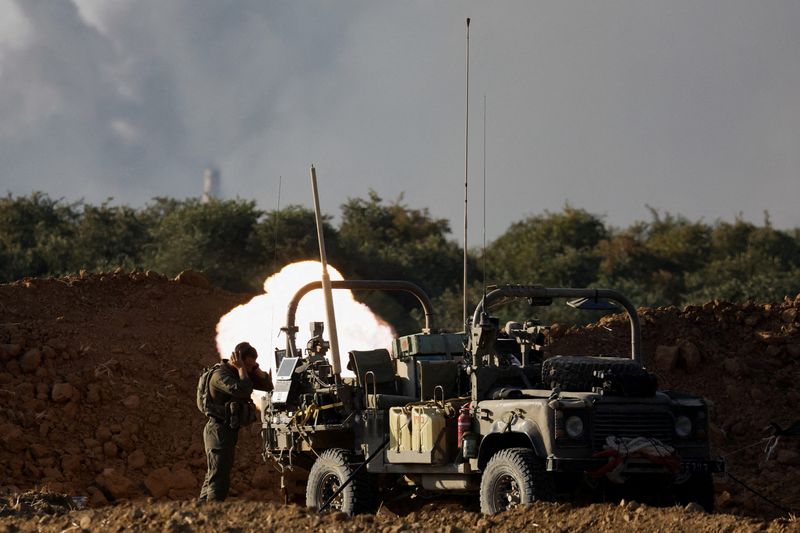By Ahmed Mohamed Hassan and Maayan Lubell
CAIRO (Reuters) - Israeli and Egyptian ceasefire negotiators are in talks about an electronic surveillance system along the border between Gaza and Egypt that could allow Israel to pull back its troops from the area if a ceasefire is agreed, according to two Egyptian sources and a third source familiar with the matter.
The question of whether Israeli forces stay on the border is one of the issues blocking a potential ceasefire deal because both Palestinian militant group Hamas and Egypt, a mediator in the talks, are opposed to Israel keeping its forces there.
Israel is worried that if its troops leave the border zone, referred to by Israel as the Philadelphi corridor, Hamas' armed wing could smuggle in weapons and supplies from Egypt into Gaza via tunnels that would allow it to re-arm and again threaten Israel.
A surveillance system, if the parties to the negotiations agree on the details, could therefore smooth the path to agreeing a ceasefire - though numerous other stumbling blocks remain.
Discussions around a surveillance system on the border have been reported before, but Reuters is reporting for the first time that Israel is engaging in the discussions as part of the current round of talks, with a view to pulling back forces from the border area.
The source familiar with the matter, who spoke on condition of anonymity, said the discussions are about "basically sensors that would be built on the Egyptian side of the Philadelphi (corridor)."
"The idea is obviously to detect tunnels, to detect any other ways that they'd be trying to smuggle weapons or people into Gaza. Obviously this would be a significant element in a hostage agreement."
Asked if this would be significant for a ceasefire deal because it would mean Israeli soldiers would not have to be on the Philadelphi corridor, the source said: "Correct."
After Reuters published this article, the office of Israeli Prime Minister Benjamin Netanyahu issued a statement saying it was "absolute fake news" that Israel is discussing withdrawing from the Philadelphi corridor.
"The prime minister insists that Israel remain on the Philadelphi corridor. He has instructed the negotiating teams accordingly, made this clear to U.S. representatives this week, and updated the Security Cabinet to this effect last night," the statement said.
The statement from Netanyahu's office appeared to diverge from remarks made on Tuesday by Defence Minister Yoav Gallant.
Gallant said, according to his office: "A solution is required that will stop smuggling attempts and will cut off potential supply for Hamas, and will enable the withdrawal of IDF (Israeli Defense Forces) troops from the corridor, as part of a framework for the release of hostages."
The two Egyptian security sources, who also spoke on condition of anonymity, said Israeli negotiators had spoken about a high-tech surveillance system.
Egypt was not opposed to that, if it was supported and paid for by the United States, according to the two Egyptian sources. They said though Egypt would not agree to anything that would change border arrangements between Israel and Egypt set out in a prior peace treaty.
At a military event on Thursday, Netanyahu said he could only agree to a deal that preserved Israeli control of the Gaza-Egypt border, but he did not spell out if that meant having troops physically present there.
Talks are underway in Qatar and Egypt on a deal, backed by Washington, that would allow a pause in the fighting in Gaza, now in its 10th month, and the release of hostages held by Hamas.
Israel started its assault on the Gaza Strip last October after Hamas-led militants stormed into southern Israel, killing 1,200 people and capturing more than 250 hostages, according to Israeli tallies.
Since then, its forces have killed more than 38,000 Palestinians, according to medical authorities in Gaza.

Israeli officials have said during the war that Hamas used tunnels running under the border into Egypt's Sinai region to smuggle arms. Egypt says it destroyed tunnel networks leading to Gaza years ago and created a buffer zone and border fortifications that prevent smuggling.
Israel's advance into southern Gaza's Rafah area in early May led to the closure of the Rafah crossing between Egypt and Gaza and a sharp reduction in the amount of international aid entering the Palestinian territory. Egypt says it wants aid deliveries to Gaza to resume, but that a Palestinian presence should be restored at the Rafah crossing for it to reopen.
(Maayan Lubell reported from Jerusalem. Additional reporting by Aidan Lewis; Writing by Christian Lowe; Editing by Angus MacSwan)